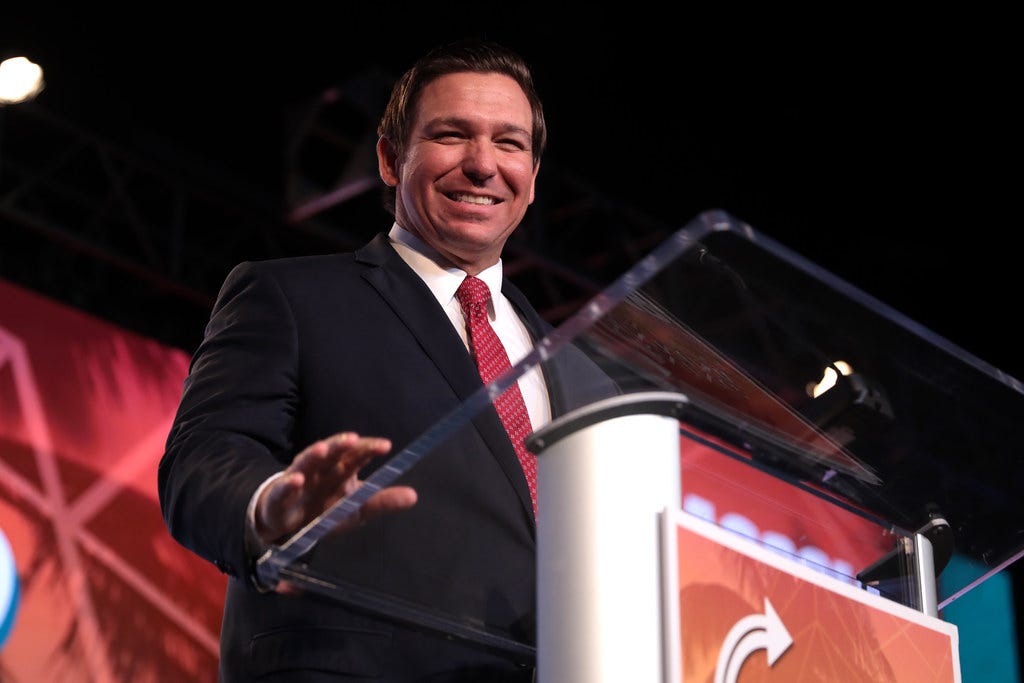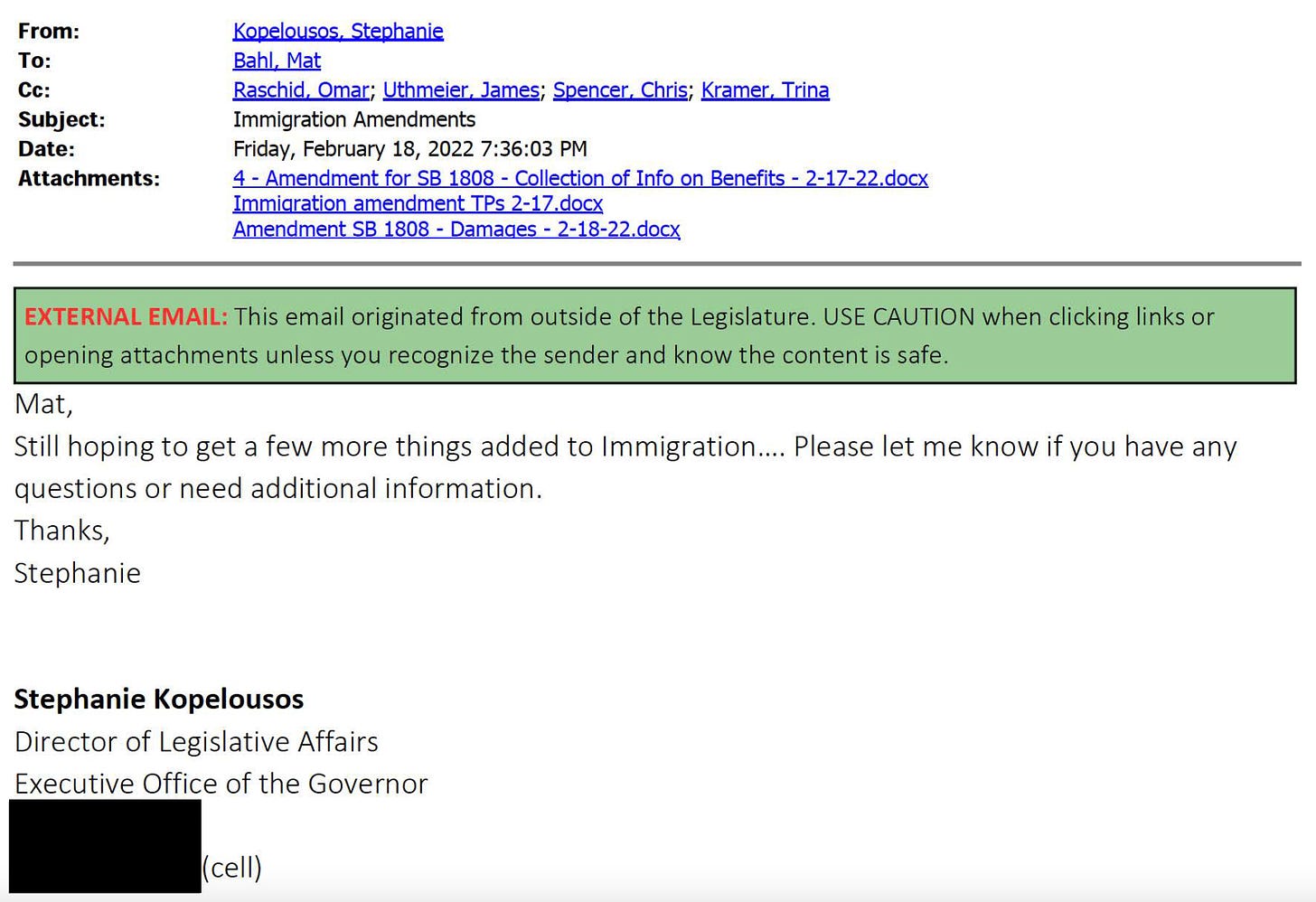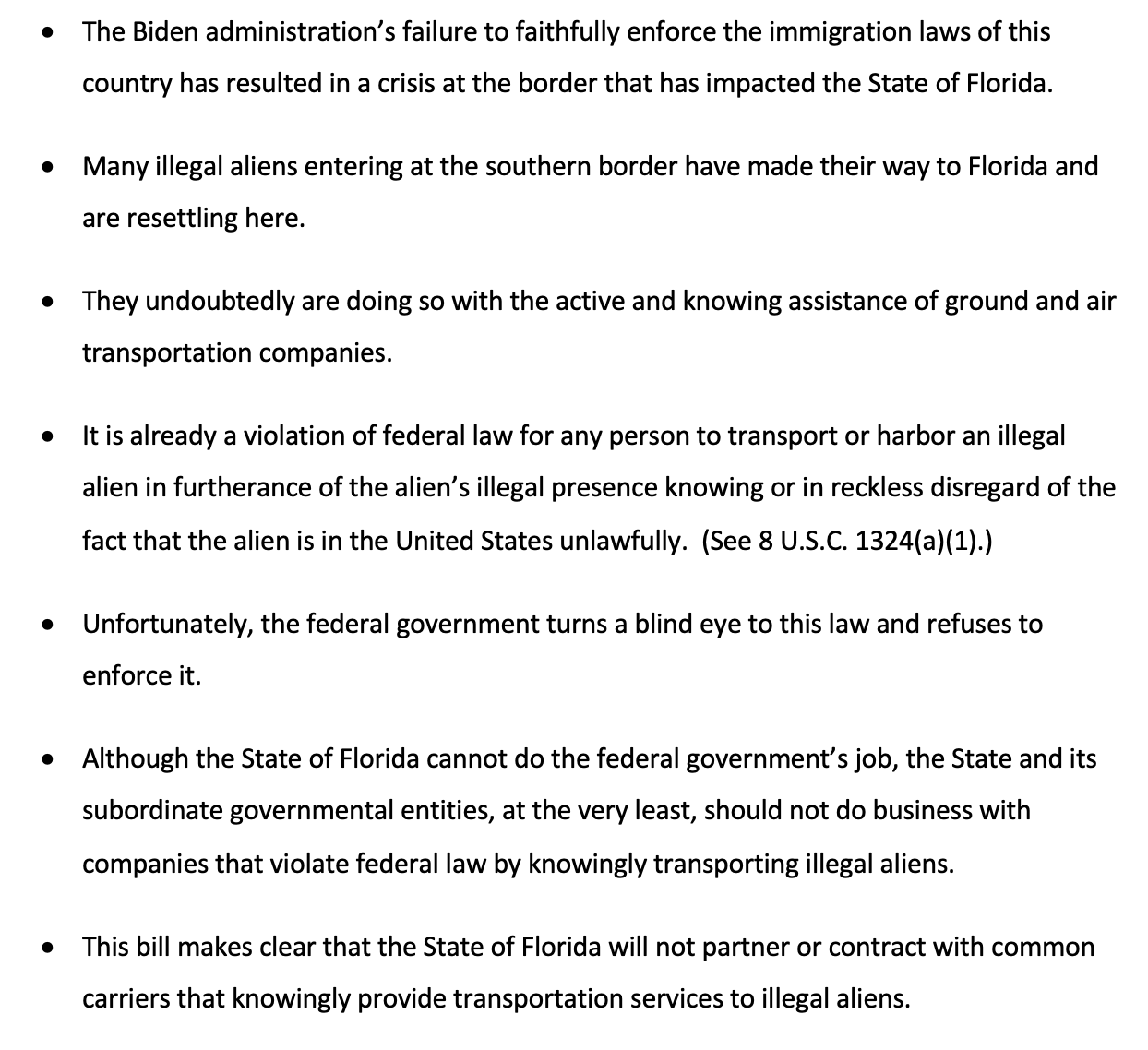Ron DeSantis could have made lawmakers reduce insurance rates by $150 a year. He was attacking immigrants instead.
Emails between Gov. Ron DeSantis' office and the Florida Legislature show little evidence that DeSantis paid much attention to the state's property insurance crisis during this year's session.

This is Seeking Rents, a newsletter and podcast devoted to producing original journalism — and lifting up the journalism of others — that examines the many ways that businesses influence public policy across Florida, written by Jason Garcia. Seeking Rents is free to all. But please consider a voluntary paid subscription, if you can afford one, to help support our work.
On Jan. 27 of this year, partway through the 2022 session of the Florida Legislature, lawmakers had the chance to save Florida homeowners an estimated $150 a year on the price of their property insurance.
The plan came from a Republican member of the Florida Senate. But lobbyists for big insurance front groups fought it. So lawmakers abandoned the idea.
Florida Gov. Ron DeSantis never said a word.
What had the governor’s attention that day? Well, emails show his office was working with lawmakers on a different DeSantis priority — a blustery anti-immigration bill attacking private companies that transport migrant children seeking asylum. (Oh, the irony.)
Specially, on Jan. 27, DeSantis’ legislative affairs director emailed a top House staffer talking points to use when discussing the governor’s anti-immigration bill, urging them, for instance, to attack the Biden administration by name. It was the only policy-related email that day between the governor’s legislative affairs director and anyone in the House or Senate, according to hundreds of emails that Seeking Rents obtained following the session via public-records requests.
Now, obviously, these emails don’t represent the sum total of all communications between DeSantis and the Legislature during the session. The governor’s office has other staffers who also work with lawmakers. And his legislative affairs director sometimes sends things to lawmakers’ personal email addresses, which wouldn’t all have turned up in these records requests.
And the DeSantis administration can presumably walk and chew gum at the same time — just because it was busy demagoguing immigrants on Jan. 27 doesn’t mean that it wasn’t working on some other stuff that day, too.
But this is emblematic of a growing criticism of DeSantis — one that extends far beyond Florida, and isn’t just limited to the Republican governor’s Democratic opponents.
DeSantis, who is widely expected to run for president as soon as 2024, spends a lot of time picking fights over divisive policy issues like immigration, racism and gender identity — emotional issues that get the governor lots of airtime on conservative media outlets like Fox News. But DeSantis doesn’t seem to spend nearly as much time trying to solve Florida’s tougher economic problems — like homeowner’s insurance rates that are now the highest in the country and nearly triple the national average.
In a recent piece published under the headline, “A broken insurance market threatens Florida and its star governor,” the Financial Times quoted a senior fellow at the International Center for Law & Economics, an Oregon-based think tank, faulting DeSantis and the Florida Legislature for not doing more to fix Florida’s insurance market.
“Lawmakers had ample warning about the need to act during the legislative session earlier this year, but they displayed more interest in waging culture-war battles than in helping Floridians to secure their lives and their property,” the analyst said, according to the Times.
These culture-war battles don’t just distract the governor’s attention, by the way. They also distract voters and reporters when DeSantis is doing favors for big business interests.
For instance, on June 29, 2019, DeSantis signed a bill making it harder for former felons to register to vote. Later that same day, he also signed a $2.8 billion tax cut for big corporations (and only for big corporations).
Or on April 19, 2021, DeSantis signed his infamous “anti-riot” bill, which the governor started promoting following nationwide protests over police brutality. Later that same day, the governor also signed a bill increasing taxes on Florida consumers by more than $1 billion a year — and using all that new money to cut more taxes for businesses.
But back to the point at hand:
This year’s legislative session ran from mid-January to mid-March. As soon as it ended, Seeking Rents requested all emails on the House and Senate systems sent to or from DeSantis’ legislative affairs director, who serves as the governor’s primary point of contact with the Legislature.
Those emails show that DeSantis’ office spent a lot of time and attention this session on that anti-immigration bill (SB 1808) and an elections bill (SB 524) that created the governor’s new “election security” unit that recently made a bunch of politically tinged — and legally shaky — arrests. (DeSantis is sometimes caught prioritizing public relations over serious policy; these emails show his office was quite concerned about making sure that the phrase “ballot drop box” was replaced with “ballot intake station” wherever it appeared in state law.)
The emails also show DeSantis’ office worked on Florida’s 15-week abortion ban. They show the administration wrote language threatening “woke” universities with budget cuts. And they show DeSantis’ staff tried to help a big developer pass a bill making it easier to convert affordable housing into more expensive, market-rate apartments.
The emails show DeSantis worked on some unequivocally good stuff, too: Like a bill strengthening data privacy protections for consumers, and an amendment meant to protect city and county laws that keep cats, dogs and other animals safe.
But there is little in the hundreds of pages of records to suggest DeSantis was paying much attention to the property insurance crisis during the session.
It’s not like they weren’t aware of it. Halfway through the session, the emails show that the office of state Rep. Erin Grall, a Republican from Vero Beach who is now running for Senate, forwarded the governor’s office a complaint from a constituent whose insurance premium had nearly doubled.
“Until this year insurance was affordable and a decent value but now after seven years with my current insurance company we have been notified that we are no longer insurable?” the constituent wrote. “Last year our premium went from 3,700.00 (it has been that cost for the last 6 years) to 6,700!!...Please look into what the insurance industry is doing, you do not need to be on a fixed income to be hurt by this type of blackmail!”

Now, there’s no question that DeSantis made property insurance a priority a couple of months later, when he called a late-May special session devoted to the issue.
But even then, the governor remained unusually deferential to the Legislature.
Remember, this is a governor who had just gleefully used his bully pulpit to browbeat lawmakers into passing new Congressional maps that were drawn by his office — and into attacking the Walt Disney Co. while they did it. But DeSantis let the Legislature take the lead on property insurance, never publicly offering a plan of his own.
And we now know that the insurance plan the Legislature sent him — which DeSantis then hailed as historic reform — didn’t do nearly enough to help homeowners. It provided only half the support to insurance companies as previous relief plans, and didn’t guarantee any savings at all for consumers.
Yet now DeSantis is blaming the Legislature for not doing more.
“You need to get rid of the scams and the litigation and I’m willing to do that,” DeSantis told CNN after Hurricane Ian bulldozed across Florida. “The Legislature has not been willing to do that thus far. But I’m confident after the election they will.”
After the election, of course.






And they still vote for Porky
Time to deport Italians.